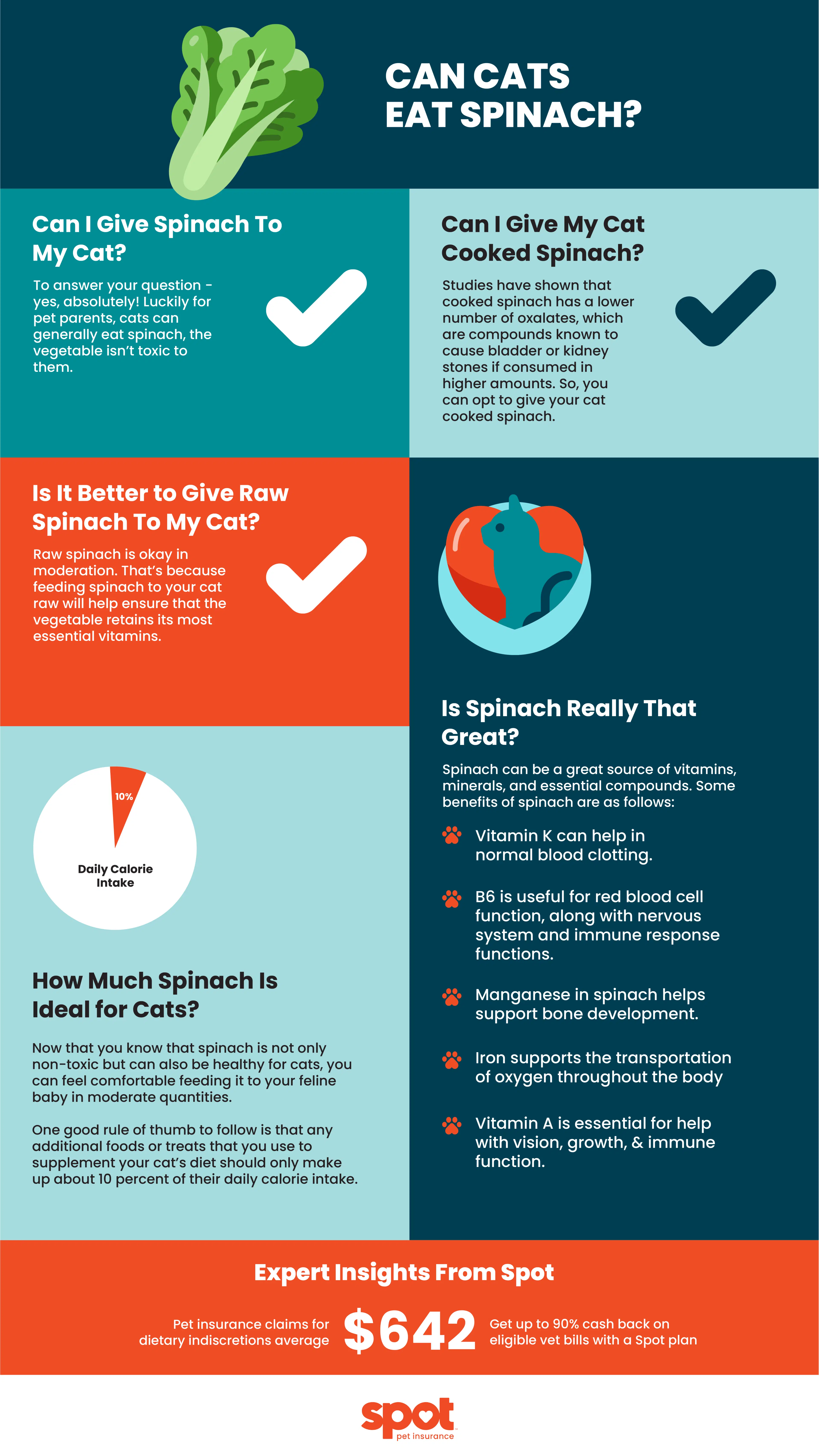If you watched Popeye the Sailor Man as a child, then you know just how good spinach is rumored to be our health. Spinach is highly regarded for its nutritional value, packed with energy and vitality. The leafy green has not only anti-inflammatory properties but also helps reduce your chances of getting cancer.1
There’s no doubt that spinach is an especially healing superfood, at least for us humans. But what about our feline friends? You might wonder if it is safe to incorporate those fresh leafy greens into their diets, find the answer below.

Can I Give Spinach To My Cat?
To answer your question - yes, absolutely!
Luckily for pet parents, cats can generally eat spinach, the vegetable isn’t toxic to them. Although your little feline buddy is a carnivore, it can also be good to supplement their diets with some fresh fruits and vegetables, and spinach is a great place to start. Just keep in mind that 90% of your cat's diet should come from protein and non-veg ingredients.
Can I Give My Cat Cooked Spinach?
Yes, if it is a small amount. Studies have shown that cooked spinach has a lower number of oxalates, which are compounds known to cause bladder or kidney stones if consumed in higher amounts.2 So, you can opt to give your cat cooked spinach.
When you want to cook spinach for your cat, it’s a good idea to steam it or gently sauté it without any salt, spices, or oils. But please note, if you boil it instead of steaming it, then a lot of beneficial nutrients can be lost.
You can offer a small amount of cooked spinach to your cat, and see if they like it. But don’t be worried if they don’t! Cats are usually picky by nature, and some aren’t so excited about fruits and vegetables either way - sometimes they prefer to eat a piece of lean meat or their favorite cat treat instead.
Is It Better to Give Raw Spinach To My Cat?
Raw spinach is okay in moderation. That’s because feeding spinach to your cat raw will help ensure that the vegetable retains its most essential vitamins. However, one downside of raw spinach is that it contains high amounts of oxalates, so you’ll have to be careful - especially if your cat has a history of urinary issues or bladder stones, as calcium oxalate can cause cats to develop harmful crystals in their urinary tract that can cause complications.3
Is Spinach Really That Great?
Spinach can be a great source of vitamins, minerals, and essential compounds. It’s full of nutrients such as Vitamin A, K, and B6, while also having lots of potassium, manganese, magnesium, calcium, folic acid, iron, and fiber. These nutrients can help in a lot of deep bodily functions, especially at the cellular level, for both human and feline bodies.
For instance, Vitamin K can help in normal blood clotting, whereas B6 is useful for red blood cell function, along with nervous system and immune response functions.4
The manganese in spinach helps support bone development and the iron supports the transportation of oxygen throughout the body.
Moreover, Vitamin A is essential for help with vision, growth, and heavily supports immune function, whereas fiber can aid in digestion.
In fact, there are even commercial cat foods that include spinach as an ingredient.3
How Much Spinach Is Ideal for Cats?
Now that you know that spinach is not only non-toxic but can also be healthy for cats, you can feel comfortable feeding it to your feline baby in moderate quantities. One good rule of thumb to follow is that any additional foods or treats that you use to supplement your cat’s diet should only make up about 10 percent of their daily calorie intake. Otherwise, it can lead to unnecessary imbalances in their diet and either cause nutritional deficiencies or excesses.3
So, let’s say your cat eats 200 calories per day, then any extra foods or treats, including spinach, should constitute only about 20 calories. And if your concern is spinach, then you’re in luck because spinach is pretty low in calories.
In general, it’s best to use moderation when you feed anything to your cat, including spinach. And it’s always a good idea to first discuss it with your veterinarian. They can use your cat’s medical history to identify risks that your little buddy may be prone to.
All in all, feeding small quantities of spinach to your healthy adult cat can be a great idea as it can serve as a highly nutritious low-calorie treat, and may actually help improve your cat’s health in certain cases. But keep in mind that it’s not a miracle cure if your cat has other nutritional deficiencies - so don’t expect it to work like one. It is definitely not a substitute for meat and other forms of protein that your cat needs, but yes, it can help provide certain benefits so it’s surely worth a try.
Expert Insights From Spot
While sharing our favorite foods with our pets can be tempting, it's important to remember that not all human foods are safe for our pets. Spot's internal data shows that pet insurance claims for dietary indiscretions average $642*, highlighting the importance of caution and research before sharing snacks with your cat.
How Can Spot Pet Insurance Help?
At Spot Pet Insurance, we understand that it can be difficult for pet parents when their companion becomes ill or injured. That’s why Spot’s accident and illness and accident-only plans offer up to 90% cash back on eligible veterinary bills. Pet parents can focus on caring for their pets, with less worry about the cost of their care. With a Spot plan pet parents also get access to a 24/7 Pet Telehealth Helpline. Speak or chat with a veterinary professional anytime you have a question about your pet’s health or behavior. If you’re ready to customize a plan for your cat, get a free quote today!

Mostly a tech person, always a pet person. I am dedicated to improving the lives of pets and their humans with technology. Off-duty, I enjoy writing about the misbehaving of computer programs and my two Aussiedoodles, Calvin and Hobbes.
*Jan 2019 to Aug 2024 Spot Pet Insurance Services, LLC claims data.
"Anti-Inflammatory Foods & Cancer." The Oncology Dietician, 16 February. 2025, https://theoncologydietitian.com/2025/02/16/anti-inflammatory-foods-to-reduce-cancer-risk/.
Herschel Michael. "Among leafy green powerhouses..." American Heart Association, 25 Mar. 2024, https://www.heart.org/en/news/2024/03/25/among-leafy-green-powerhouses-spinach-packs-a-wallop.
“Can Cats Eat Spinach?” Purina, 28 Jul. 2025, https://www.purina.com/articles/cat/feeding/can-cats-eat/spinach.
Rowlands, Richard. "Can Cats Eat Spinach?" Earthborn Holistic, 8 Aug. 2025, https://www.earthbornholisticpetfood.com/blog/pet-nutrition/can-cats-eat-spinach/.
The information presented in this article is for educational and informational purposes only and does not constitute or substitute for the advice of your veterinarian.












